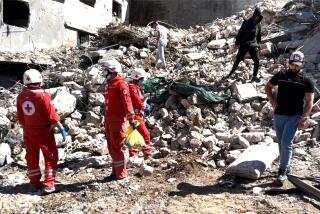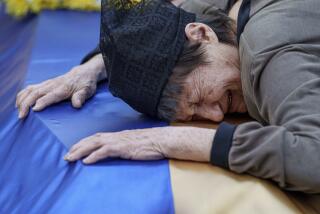Provincial Capital Reeling From Impact of Air Raid
- Share via
PRISTINA, Yugoslavia — NATO did not discriminate among ethnic groups when its airstrikes killed at least 10 civilians and injured 20 more in the center of Kosovo’s capital early Wednesday morning.
A family of five ethnic Turks, three of them children, died when NATO rockets blasted one of Pristina’s oldest neighborhoods, reducing several houses to burning rubble.
A Serbian neighbor, three Serbian men working at a nearby post office and telephone exchange and an elderly Serbian man also were killed in the attack, residents said in interviews.
On the heaviest night of bombing here since the North Atlantic Treaty Organization first attacked Yugoslavia two weeks ago, wave after wave of bombers struck central Pristina around 12:40 a.m. while most of the city slept.
On Wednesday afternoon, an older ethnic Albanian couple were eating bread amid shattered glass in their small, dark kitchen as the last flames burned through the house next door.
Dazed and bloodied, the couple fought back tears as they wondered what had become of the people next door.
The couple, ages 64 and 77, were too frightened to give their names because they had fought the blaze themselves with a garden hose while the Serbian fire brigade concentrated on other buildings.
But as the woman and her husband led a foreign journalist through the ruins, they left no doubt as to whom they blamed.
“I will send the bill to Mr. Clinton,” the retired ethnic Albanian professor said, and he gestured at the smoldering destruction that surrounded him. “He has to pay for all of this. We are not soldiers. We are civilians.”
Flying rubble from the massive blasts that shook the city center like an earthquake downed the steel security gates at the couple’s driveway and crushed their small car.
Parts of other vehicles were strewn all around. A section of what looked like a transmission sat on a neighbor’s roof, while a suspension spring hung from a branch of the tree in their frontyard.
NATO’s attack was concentrated on several government buildings nearby: the headquarters for the Provincial Executive Council, the national bank tower, the social security administration and a post office.
All suffered heavy damage from several bombs or missiles, but the six-story Provincial Executive Council building, where Kosovo’s top Serbian official, Zoran Andjelkovic, had his offices, was hit hardest.
Most of the building’s top floor was blown away, and the force of the explosions tossed twisted steel reinforcing rods more than a block away and threw chunks of concrete even farther.
‘Genocidal NATO Armada’
The airstrikes came less than an hour after the April 6 anniversary of Nazi Germany’s bombing of Belgrade in 1941, an event as important to Serbian history as the Japanese bombing of Pearl Harbor is to America’s past.
The Serb-dominated executive council did not miss the opportunity to score propaganda points from the civilian casualties in Wednesday morning’s strikes.
It condemned what it called a “barbarian attack” by the “neo-fascist, genocidal NATO armada.”
The shock wave from the NATO bombs was so powerful that it snapped dozens of limbs from trees and smashed plate-glass windows in shops and restaurants hundreds of yards away from blast sites.
A jagged piece of bomb shrapnel as long as a man’s finger landed about two blocks away from the intended targets of the airstrikes.
Mesut Gash, his wife and their four children lived in a two-story house just behind the post office, on Zanatska Street, one of Pristina’s oldest neighborhoods. It was best known for its handicrafts.
Neighbors said Gash, who was an ethnic Turk, his wife and three of his daughters, ages 6, 7 and 9, were buried in the rubble of their house, which was a flattened ruin Wednesday afternoon.
Rescuers managed to carry Gash’s 2-year-old daughter from the remains of the burning house before it collapsed. She lay unconscious Wednesday in intensive care at Pristina’s hospital, Dr. Nebojsa Brankovic said in an interview.
Neighbor’s Son Comes to Victim’s Aid
Brankovic, a Serb, was speaking just a few feet away from the crackling pit that was once the Gashes’ home. He had come to care for his elderly father, Sasha, a longtime friend of the Gashes, and ended up saving the life of their youngest child.
An elderly woman, apparently Mesut Gash’s mother, also was saved, Brankovic said.
“All the neighbors came to help the family,” he said. “They only picked up the baby and the old lady, and how they survived, I don’t know.”
In front of the destroyed houses were two craters, each about 3 yards wide, that were apparently caused by rockets.
The NATO air raids also knocked out the water supply in central Pristina and blew up a fuel storage site at Devet Jugovica, a village north of the city, setting off a huge fire that spewed a thick column of black smoke.
In what appeared to be an attack on large fuel tanks near Pristina’s railway station, a bomb hit a nearby Orthodox Christian cemetery and blew a crater about 6 yards deep and twice as wide where several Serbs’ graves used to be.
A man staggered around the toppled and cracked marble tombstones searching for the grave of his son. It was obliterated. He fell to his knees at the crater’s edge and sobbed uncontrollably.
“Is it possible something like this could happen?” he wailed. “Clinton, you will pay for this.”
*
All of Paul Watson’s dispatches from Kosovo are available on The Times’ Web site at https://www.latimes.com/dispatch.
Many charities are accepting contributions to help refugees from Kosovo. The list may be found at https://www.latimes.com/kosovoaid.
More to Read
Sign up for Essential California
The most important California stories and recommendations in your inbox every morning.
You may occasionally receive promotional content from the Los Angeles Times.













